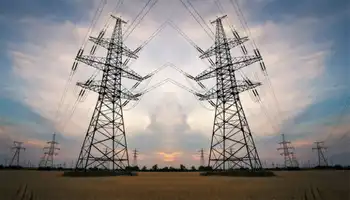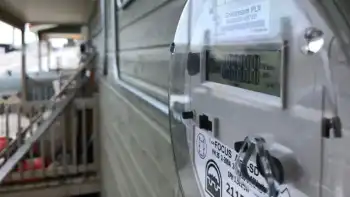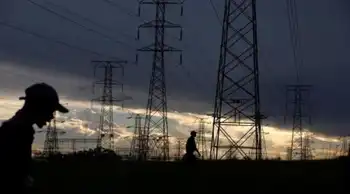PSC seeks utilities' records
By Knight Ridder Tribune
NFPA 70e Training
Our customized live online or in‑person group training can be delivered to your staff at your location.

- Live Online
- 6 hours Instructor-led
- Group Training Available
The demand follows a May ruling by the commission that raised questions about possible conflicts of interest between the two companies that could benefit Constellation to the detriment of Baltimore Gas and Electric Co. customers. Constellation executives deny any conflicts of interest and say BGE customers benefit from its being part of a larger corporation.
The action reflects a more activist role by the commission since Gov. Martin O'Malley replaced several appointees of his predecessor, Republican Robert L. Ehrlich Jr., effectively taking control of the regulatory panel. O'Malley, who campaigned on a pledge to block a steep BGE electricity rate increase but found that he was unable to do so, sent the PSC a letter this month asking for expedited hearings on the corporate relationship. "Constellation is recording record profits while consumers are paying record increases," O'Malley, a Democrat, said yesterday. "The question... is whether the relationship between Constellation the parent company and BGE the electric distribution company is a relationship that allows for the earning of profits that are unreasonable and unfair at the expense of Maryland consumers."
In its subpoena, the PSC asks Constellation to provide documents detailing how much money it is making selling electricity to BGE, which buys its power from wholesale suppliers through competitive bidding. The commission also asked for minutes from board meetings, salary information and other documents with the aim of determining whether BGE executives' decisions are influenced by the utility's ties to Constellation.
The subpoena was issued on the day an energy summit hosted by O'Malley in Annapolis focused on long-term solutions to rising energy costs and to the threat of global warming. The PSC began hearings that looked at ways to address the state's growing energy shortfall. Although the administration is concentrating on conservation and ensuring that Maryland will have adequate energy supplies, the subpoena is a reminder that O'Malley has not given up on short-term relief for customers socked with a 70 percent increase in electric rates over the past year. Paul J. Allen, vice president of corporate affairs at Constellation, who participated in the governor's summit, said the company will seek to cooperate.
"The leadership of Maryland and BGE customers need to be comfortable with that relationship" between Constellation and BGE, he said. "If they need to go through a process of examination to satisfy themselves, we will of course be constructively engaged n helping them understand it." The company is careful to follow all laws and regulations to ensure that the relationship remains aboveboard, he said. "We make sure all our employees, top to bottom, are aware of the rules to be followed," Allen said. PSC Chairman Steven B. Larsen, an O'Malley appointee, said he is hoping to get information related to possible conflicts of interest between Constellation and BGE that the commission identified in its May order on BGE rates.
Among the issues the PSC noted were the dual roles of some executives. The order singled out John Collins, Constellation's former chief risk officer, whose responsibilities include helping the energy wholesaler formulate its bids for energy auctions in other states. Collins changed hats in the Maryland auction, serving as n adviser to BGE, which acts as a buyer in such auctions. In that role, Collins was able to see the bids of companies competing against Constellation for the utility's business.
"We're interested specifically in the corporate governance and decision-making between BGE and Constellation... and we have questions about the margins Constellation earns on electric sales to BGE," Larsen said. If Constellation complies with everything in the subpoena, the commission will get an inside look at the way the company prices the electricity it sells in Maryland. Constellation took title to BGE's power plants as part of the state's move toward deregulation in 1999. Now the utility must buy its power from wholesale suppliers, Constellation being the largest.
Constellation won contracts to supply about 70 percent of BGE's power last year, contributing to the record rate increase that took full effect in June.
Critics contend that Constellation is selling that power to BGE for far more than it costs to produce. Company executives have said that charge is unfounded, noting that energy costs have risen nationwide. The subpoena seeks to force Constellation to back up those claims by providing details about the efficiency and output of its Maryland power plants, and about its profit margin from wholesale energy sales and from its contracts to sell power to BGE. Such information is typically kept secret on the grounds that it could aid competitors. Constellation has been asked to provide any board minutes and documents mentioning BGE, the PSC and other topics pertaining to the company's bidding in Maryland energy auctions.
The subpoena also asks for detailed information about specific BGE executives who are also Constellation officers. In part, the commission wants to know what role each executive plays with the two companies and how each company contributes to their salaries. The commission is trying to determine whether some BGE executives are paid based on how well Constellation performs, which could get to the heart of whether there is an inherent conflict of interest in their dual roles. O'Malley, who sharply criticized the PSC last year for being too cozy with the industry, said he wants the panel to consider whether a breakup of Constellation and BGE would benefit consumers and whether some of the company's costs were inappropriately borne by consumers instead of by shareholders.
Industry analysts have questioned whether spinning off BGE would provide any benefit to consumers, but some noted that some sort of rate cut could be worked into a deal to sell the utility to a competitor, assuming that one materialized and obtained regulatory approval.
Such questions were pushed aside during the energy summit. Industry officials, academics and environmental and consumer advocates joined lawmakers for a three-and-a-half-hour discussion of the state's long-term energy future, yielding consensus on two points: Conservation is good, and Maryland's energy supplies are not adequate. Beyond that, agreement was scarcer.
Utility company officials promoted plans to "decouple" profits from the distribution of electricity from the amount of power a consumer uses. They said that change, which is being implemented for Pepco customers in suburban Washington, would remove a disincentive for the companies to promote conservation. People's Counsel Paula M. Carmody said decoupling efforts are almost universally opposed by consumer advocates on grounds that they guarantee profits without adequate assurances that consumers will benefit. Some panelists favored "smart meters" to help consumers manage their energy use. Others said that would do no good.
Some want heavy investment in transmission lines to bring power in from other states. Others said the money should go into solar and wind power production closer to home.
O'Malley said the summit was like perusing the table of contents of a textbook on energy and promised more hearings to get into specifics. He said he wants the Maryland Energy Administration to develop a comprehensive energy plan in time for the next General Assembly session. "The challenge of developing renewable and sustainable and affordable sources of energy is one of the greatest challenges that this state has ever faced," O'Malley said.
"Every state is struggling with the challenges of rising prices, of rising tides an rising temperatures." Some criticized the panels as weighted too much toward industry and said the summit was skirting the real issues of whether Maryland should re-regulate the electric industry and reinstate the rate caps that were in effect for several years until last year. "Why not impose immediate rate caps to pre-rate-hike levels while we investigate the BGE-Constellation relationship?" Rob Savage, co-chairman of the Maryland Green Party, asked the panelists during a question-and-answer period. "Why do we have to be robbed while we investigate re-regulation?"











